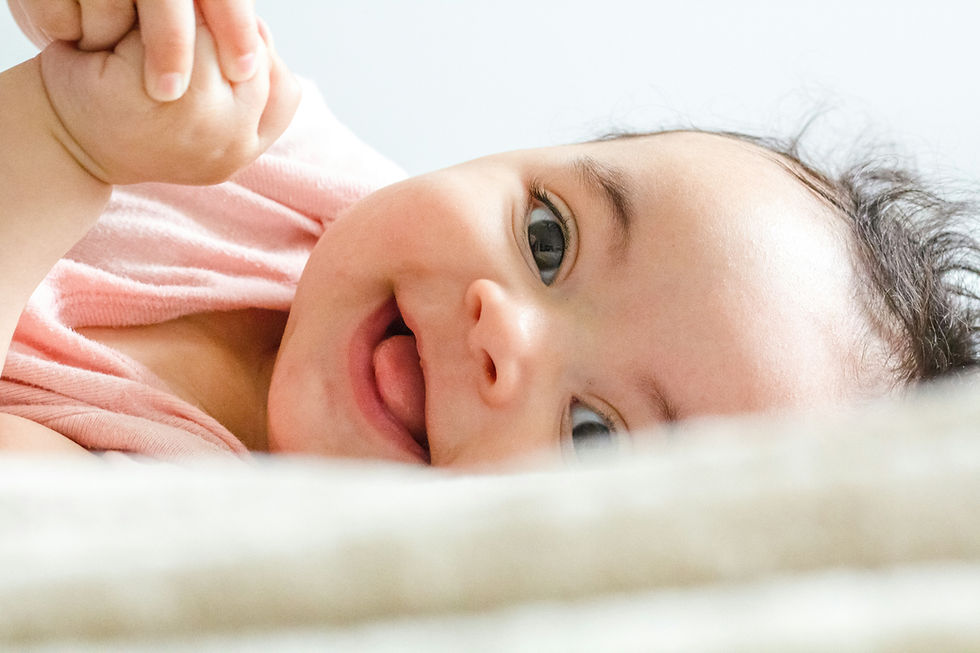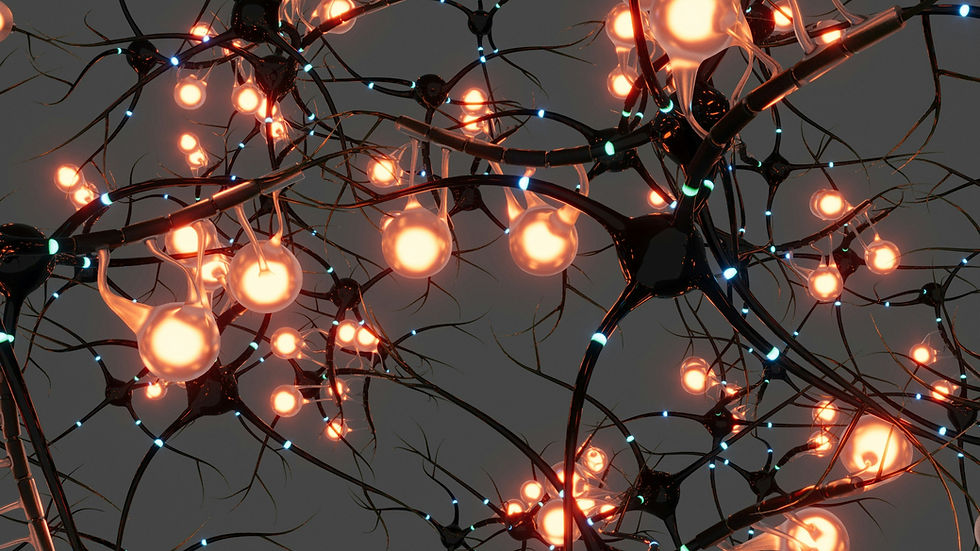Rewiring for Motherhood: Understanding Baby Brain
- Maddie Hughes

- Aug 2, 2025
- 4 min read

We’ve all heard of ‘baby brain’ – the misplaced keys, the forgotten appointments, the thought interruptions. It’s often depicted for laughs, but behind the anecdotes is a more serious reality: pregnancy and early motherhood do change the brain.
Yet instead of viewing these changes as a kind of cognitive decline, science is increasingly showing they are signs of maternal adaptation – a brain refocused, not malfunctioning. Physical changes are a natural part of pregnancy, but cognitive changes should be just as anticipated.
So, what is really going on in the brain during pregnancy and postpartum? And what can be done to support maternal mental clarity during this pivotal time?
The Facts Behind the Fog
‘Baby brain,’ also known as ‘pregnancy brain,’ describes the forgetfulness, lapses in concentration and mental fog that many women report during late pregnancy and early motherhood.
Rather than cognitive decline, the changes many women experience during pregnancy and early motherhood are better understood as adaptive brain plasticity. A 2022 study by European researchers found that during pregnancy, women’s brains change in subtle but powerful ways to prepare for motherhood.
Using brain scans, the researchers discovered that some areas of the brain (particularly those involved in understanding other people’s emotions) actually shrink in size. But this isn’t a bad thing. It’s more like a fine-tuning.
The brain becomes more efficient at reading social cues, managing feelings, and forming strong bonds with their new born.
These changes are driven by pregnancy hormones like oestrogen and progesterone, which flood the body in late pregnancy. And surprisingly, the study also found that these brain changes were linked to better mood, not worse.
So while your memory for small things might feel off, your brain is likely becoming more focused on what matters most: connection, care, and protection.
The Role of Hormones, Sleep, and Stress
Hormones play a central role in reshaping the brain. We know that pregnancy floods the body with oestrogen and progesterone, but also the hormones oxytocin and prolactin – each of which interacts with neural pathways involved in mood, memory, and emotional regulation.
At the same time, late pregnancy and postpartum are marked by chronic sleep disruption, especially as the body prepares for night feeding. Sleep deprivation alone is enough to impair short-term memory and executive functioning, particularly when paired with the emotional and mental load of new motherhood.
Stress and anxiety further complicate the issue. The cognitive demands of planning, anticipating, and constant multitasking can lead to mental overload. This isn't ‘baby brain’ as a biological flaw; it's the result of demanding caregiving.
Why Nutrition Matters for the Maternal Brain
Certain nutrients are especially important for brain health during pregnancy and postpartum, and deficiencies can exacerbate mental fog or fatigue.
Omega-3 fatty acids (especially DHA): DHA is a structural fat found in high concentrations in the brain. During pregnancy, the fetus draws on the mother’s DHA stores for its own brain development, potentially depleting her reserves. Low DHA has been linked to mood disturbances and memory issues. Foods like oily fish (salmon, sardines), flaxseeds, and algae supplements can help replenish it.
Iron: Iron is critical for oxygen transport and energy metabolism in the brain. Pregnancy increases iron demands significantly, and iron deficiency (especially postpartum) is strongly associated with fatigue, poor concentration, and even postpartum depression. Good sources include red meat, lentils, spinach, and fortified cereals.
B vitamins (especially B12 and folate): These are essential for neurotransmitter synthesis and nerve function. Deficiencies can cause brain fog, low mood, and impaired memory. They are found in leafy greens, eggs, dairy, and fortified grains.
Choline: A lesser-known nutrient, choline plays a key role in brain development and memory. It is especially important during the third trimester and is found in eggs, liver, and soybeans.
Supporting the maternal brain nutritionally is not just about preventing deficits; it’s about building resilience.
How to Support the Brain in Pregnancy and Motherhood
These strategies can help support cognitive clarity:
Sleep, wherever possible: Easier said than done, but even short naps can restore attention and memory.
Write it down: Use lists, phone reminders, or sticky notes. Outsourcing memory is a survival strategy, not a failure.
Fuel the brain: Focus on whole foods rich in the nutrients above. Supplement if needed (especially DHA and iron).
Reduce the mental load: Share the planning, anticipating, and scheduling burden where possible.
Practice self-compassion: Understand that this is a time of profound physiological change. Be kind to yourself.
Social connection: Talking with other mothers, friends, or professionals can reduce stress and improve mood.
Cognitive Change, Not Cognitive Decline
It’s time to retire the trope of the forgetful new mum. Yes, cognitive changes occur, but they reflect adaptation, not degeneration. ‘Baby brain’ isn’t a bug in the system; it’s a feature of the maternal brain’s transformation.
Just as we expect physical changes during pregnancy, we should expect cognitive ones too. The difference is that society is quick to accommodate a baby bump, but far slower to recognise the psychological reconfiguration that supports caregiving.
What women need is not a dismissal, but structural support: longer parental leave, flexible work environments, and open conversations about maternal mental health.
The maternal brain is rewired to prioritise human connection, emotional sensitivity, and survival – it reflects an ancient evolutionary truth: raising a child is one of the most complex tasks a brain can undertake.
References
BabyCenter. (2025). Pregnancy brain: Why it happens and how to be less forgetful.
BBC News. (2016, December 19). Pregnancy changes the brain, say researchers.
Derbyshire Family Health Service. (2025). Baby Brain – is it a thing?
Hoekzema, E., Barba-Müller, E., Pozzobon, C., Picado, M., Lucco, F., García-García, D., Soliva, J. C., Tobeña, A., Desco, M., Crone, E. A., Ballesteros, A., Carmona, S., & Vilarroya, O. (2017). Pregnancy leads to long-lasting changes in human brain structure. Nature Neuroscience, 20(2), 287–296.
Oxford Health NHS Foundation Trust. (2024). Baby Brain Development and Attachment.
Rehbein, E., Kogler, L., Kotikalapudi, R., Sattler, A., Krylova, M., Kagan, K. O., Sundström‐Poromaa, I., & Derntl, B. (2022). Pregnancy and brain architecture: Associations with hormones, cognition and affect. Journal of Neuroendocrinology, 34(2).




Comments